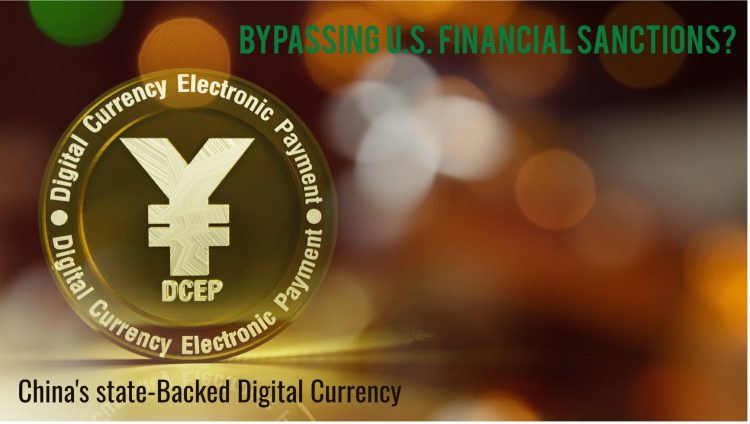
Ina Mackinnon of Alba Compliance Pte Ltd,
23rd April, 2021
China’s national digital currency is making waves as a groundbreaking parallel payment network beyond American oversight, meaning it will be crippling U.S. sanctions policy, excluding the world’s second-largest economy from a dollar-based system that runs on a network of financial institutions globally.
Designed by People’s Bank of China (PBoC), the DCEP or “Digital Yuan” or “e-CNY” or “Digital RMB” is claimed to have a higher security than Bitcoin as it records clear time and information on both sides of each transaction and only China’s central bank can see transaction information, providing a “controllable anonymity”. That got our attention as keen on finding out on regulation of DCEP and how DCEP trading affects China’s efforts to combat corruption, money laundering, tax evasion, and terrorist financing.
DCEP will be both account-based and token-based; it will be account-based between the central bank and private payments intermediaries, and token-based between those intermediaries and individuals. Unlike in private digital currencies, such as Bitcoin, that second layer will be a tokenized claim instead of a claimless token. Individuals using it will be able to make payments and hold cash outside commercial banking accounts and without investing in liquid money market funds.
In original article in American Affairs Journal, Sahil Mahtani illustrates what China is trying to do by considering Asia’s largest financial center, Hong Kong’s chief executive, Carrie Lam’s current problem: receiving her HK$5.2 mln ($672,000) salary in “piles of cash” stored at her home as a result of U.S. sanctions. It is quite unbelievable but Ms Lam no longer has access to credit cards or even a bank account, as other Hong Kong’s political leaders and their families losing access to American financial system.
Inevitably we ask the question whether the United States is going to lose much of the sanctioning power it has enjoyed for the last several decades.
Under the framework of the DCEP, China could operate its own cross-border banking system independent from the Society for Worldwide Interbank Financial Telecommunication (SWIFT) Clearing House Interbank Payments System (CHIPS) system.
China’s transition from SWIFT to its own Cross-Border Inter-Bank Payment System (CIPS) is part of ongoing Inthanon-LionRock project of Hong Kong Monetary Authority (HKMA) and the Bank of Thailand, an international payment system for the yuan, is an example of its preparations for trade conflicts with the U.S. and to prepare for U.S. monetary sanctions in the future. The full results of the second phase of the Inthanon-LionRock were published by HKMA on 24th March, highlighting that the infrastructure to send funds across borders outside the current dollar-based banking system is now almost in place.
While it is still early for DCEP, foreign companies operating in China, financial and non-financial institutions need to closely track the development and acceptance of DCEP, monitor any arising risks, assess how their financial and FinTech products fit within the new DCEP ecosystem, adjust China-related business operations to support or limit the use of DCEP, and adjust reporting requirements and financial reserves required due to DCEP use.
In response to the requirements and comments raised by the Financial Task Force (FATF) during its review and assessment of China’s overall AML work in 2019, on December 30, 2020, the PBoC promulgated the draft Administrative Measures on the Anti-Money Laundering and Counter Terrorism Financing by Financial Institutions for public comment. The Draft Measures are intended to supersede the Measures for the Anti-Money Laundering Supervision and Administration of Financial Institutions (for Trial Implementation) issued by PBoC in 2014 and also extend its coverage to counter terrorism financing (CTF) obligations of financial institutions.
Development of digital currency naturally begs the questions on the emphasis on measures to protect individual data privacyand fight against telecom and payments fraud. In China, fraud via mobile phones and other internet systems occurs often, which is a major concern for authorities and the public. It is the question of finding a balance between Authorities, especially AML anti-drug agencies should have access to data while trying while trying to protect the privacy of it. The rules of European Union’s General Data Protection (GDPR) should give a valuable insight for adoption of various safeguards to protect user’s funds and data.
During your regulatory review and compliance controls implementation the business should scrutinise the onboarding of new regulations and continue periodic revision of existing regulations to adapt with the ever-changing regulatory environment in South East Asia and global regulations.
Your systems should support AML practices to enhance the efficiency in overseeing suspicious transactions, in compliance with global efforts in policing financial crime.
The Draft Measures require to establish Enhanced internal control and risk management as PBoC strengthens its supervisory mechanism regarding AML/CTF, conducting:
- AML/CTF law enforcement inspections;
- risk assessment/monitoring in order to understand FI and non-FIs’ risk status promptly and accurately;
- specific risk assessment at the premises on entity’s overall AML/CTF risks or risks in certain business lines in order to detect loopholes or weakness in the AML/CTF risk management;
- Issuing an AML regulatory risk alert letter if PBOC notices AML/CTF risks or obvious loopholes in its AML/CTF work which must be rectified;
- Having a risk-warning conversation with directors, supervisors, senior management officers or department heads if the AML/CTF function has not been performed adequately or if any material risk incident has occurred; and
- conducting onsite visits as necessary and exercising ongoing monitoring of its implementation of the rectification measures which are expected to be taken by the entity to address the AML/CTF risks/issues.
In addition, the Financial Institutions should consider defining clearly the Settlement finality in the legal and operational sense, therefore guaranteeing transaction completion definitively, revoking any potential reversal.
Singapore follows the developments, the Monetary Authority of Singapore launched a multi-year, multi-phase project called Project Ubin with the industry to explore the use of blockchain and DLT for the clearing and settlement of payments and securities. As of March 2021, MAS successfully implemented real-time gross settlement (RTGS) systems with full transaction privacy and settlement finality while preventing single points of failure. Project Ubin effectively reimagined institutional infrastructure in Singapore by implementing blockchain platforms.
Here in Alba Compliance, we are keenly following the developments of this exiting transformation in the wholesale cross-border payments.
#Financial market infrastructure #payment service providers # non-bank players #FinTech #Financial SErvices #ecosystem for cross-border portfolio investment #electronic payments #regulatory ecosystems #Capital Markets #customer experience and access
RESOURCES / NOTES
- https://americanaffairsjournal.org/2021/02/carrie-lams-problem-and-ours-chinas-state-backed-digital-currency/
- https://www.scmp.com/business/banking-finance/article/3097680/us-sanctions-will-make-everyday-life-headache-hong-kongs
- https://www.hkma.gov.hk/media/eng/doc/key-functions/financial-infrastructure/Report_on_Project_Inthanon-LionRock.pdf
- http://www.court.gov.cn/zixun-xiangqing-242911.html
- https://www.ajudaily.com/view/20210317180131596
- https://www.caixinglobal.com/2021-02-20/zhou-xiaochuan-chinas-choices-in-developing-its-digital-currency-system-101664882.html



